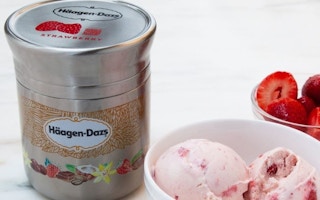In a joint attempt to phase out plastic packaging, the world’s largest companies have partnered with global recycling firm TerraCycle to introduce a new zero-waste scheme that could change the way people consume mass-produced goods.
To continue reading, subscribe to Eco‑Business.
There's something for everyone. We offer a range of subscription plans.
- Access our stories and receive our Insights Weekly newsletter with the free EB Member plan.
- Unlock unlimited access to our content and archive with EB Circle.
- Publish your content with EB Premium.
Consumer goods giants Nestlé, Procter & Gamble, Unilever, PepsiCo, Danone and Coca-Cola unveiled the new scheme, called Loop, at this year’s World Economic forum in Davos, where the initial idea for the circular delivery system emerged two years ago.
Slated to begin its pilot scheme in Paris and New York City in May, Loop enables customers to make online orders for a variety of household foods and personal care products such as shampoo, mouthwash, juice and ice-cream—items that usually come in single-use plastic packaging. Under the new scheme, the goods are delivered in refillable containers that are collected from the consumer’s doorstep to be cleaned for reuse.
As part of the Loop scheme, for example, Nestlé is debuting a reusable stainless steel double-walled ice cream container for its Häagen-Dazs brand. The durable packaging is designed to keep ice cream fresh and cold from the moment the canisters are filled until they are delivered to the customer’s doorstep.
Laurent Freixe, executive vice president of Zone Americas at Nestlé, said:“Loop provides a much-needed innovation platform, challenging companies to take a fresh look at our value chains and integrate reusable product packaging as part of our efforts to reduce waste.”
The company is planning to eliminate more of its single-use plastic products such as films, ice cream cone wrappers and laminated paper cups, and make all of its packaging recyclable by 2025.
Loop has been welcomed by observers as the first step towards shifting the conversation on plastic waste from one that has focused on changing consumers’ lifestyles to one that places responsibility with companies. While the onus has been on individuals to alter their consumption habits by swearing off plastic straws, critics and environmentalists alike have long pushed for corporations, the world’s largest plastic polluters, to clean up their act.
“Loop is the first-ever global platform to partner with major brands and retailers with the objective of shifting from a disposable platform to a durable and circular supply chain where manufacturers design, own and take responsibility for their products and packaging in the long term,” said Tom Szaky, chief executive of TerraCycle.
On how Loop promotes a sustainable model of consumption while retaining customer convenience, he added: “Since the empty packages are returned to Loop, we are aware of consumers’ consumption rates and replenish only when they have finished the product. The target for turnaround is two days. We tried to come up with a way to solve for disposability but maintain the virtues of disposability, which are convenience and affordability.”
The new scheme is also putting a fresh take on consumption by renewing focus on the values of reduce and reuse, instead of concentrating on improving current methods of recycling or developing recyclable material.
“Every day, more and more disposable material gets put in the ocean and landfills, so no matter how much we clean the ocean or recycle we’re never going to solve the problem,” said Szaky. “To us, the root cause of waste is using things once, and that’s really what Loop tries to change as much as possible.”








